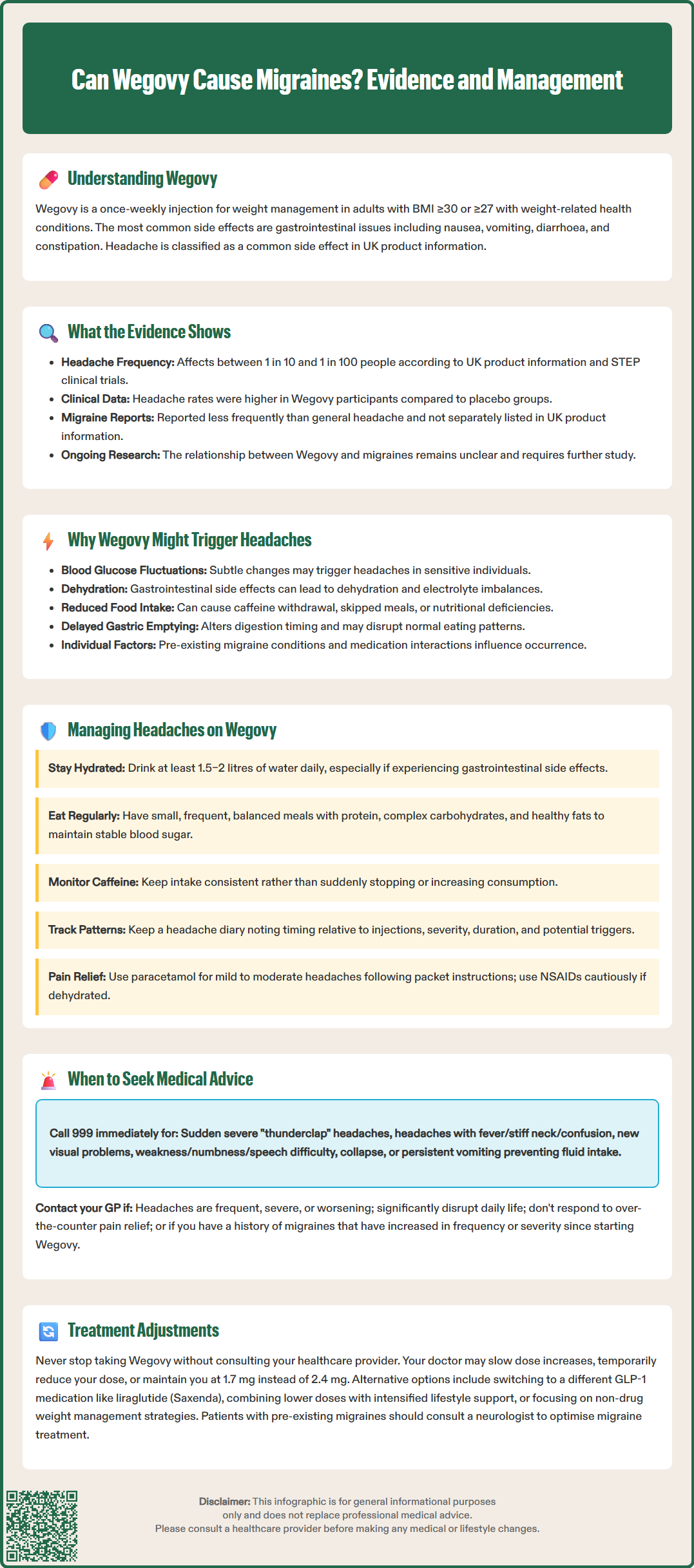
Wegovy (semaglutide 2.4 mg) is a GLP-1 receptor agonist licensed in the UK for weight management in adults with obesity or overweight with comorbidities. Whilst gastrointestinal side effects are most common, headache is classified as a common adverse reaction in UK product information. Many patients wonder whether Wegovy can trigger migraines specifically. Understanding the evidence, potential mechanisms, and management strategies for headaches during Wegovy treatment is essential for informed decision-making. This article examines the relationship between Wegovy and migraines, explores why headaches may occur, and provides guidance on when to seek medical advice.
Quick Answer: Wegovy can cause headaches, which are classified as a common adverse reaction, though migraine specifically is less frequently reported and not separately listed in UK product information.

Mounjaro® is the most innovative GLP-1 medication proven to dramatically curb appetite, hunger, and cravings to help professional men achieve substantial weight loss.
Start Here
Wegovy® is a weekly injectable GLP-1 medication with proven effectiveness in reducing appetite, hunger, and cravings to help busy professionals lose significant weight.
Start HereWegovy (semaglutide 2.4 mg) is a prescription medicine licensed in the UK for weight management in adults with a BMI ≥30 kg/m², or ≥27 kg/m² with at least one weight-related comorbidity. It belongs to a class of medications called glucagon-like peptide-1 (GLP-1) receptor agonists, which work by mimicking a naturally occurring hormone that regulates appetite and food intake. Wegovy is administered as a once-weekly subcutaneous injection and is intended to be used alongside a reduced-calorie diet and increased physical activity.
Like all medications, Wegovy can cause side effects, though not everyone experiences them. The most commonly reported adverse effects are gastrointestinal in nature and include:
Nausea and vomiting
Diarrhoea or constipation
Abdominal pain and bloating
Indigestion and flatulence
These gastrointestinal symptoms are typically most pronounced when starting treatment or increasing the dose, and often improve over time as the body adjusts to the medication. The dosing schedule for Wegovy involves a gradual escalation over 16–20 weeks to minimise these effects.
Beyond gastrointestinal symptoms, headache is classified as a common adverse reaction in the UK product information. Other side effects have been documented in clinical trials and post-marketing surveillance. Understanding the full spectrum of potential side effects, including neurological symptoms such as headaches and migraines, is essential for patients and healthcare professionals to make informed treatment decisions and manage any emerging symptoms effectively.

Clinical trial data and real-world evidence provide insight into the relationship between Wegovy and headaches. In the pivotal STEP (Semaglutide Treatment Effect in People with obesity) clinical trial programme, headache was reported as an adverse event, with rates generally higher in the semaglutide groups than placebo. The UK product information classifies headache as a common adverse reaction (affecting between 1 in 10 and 1 in 100 people).
In the STEP-1 trial published in the New England Journal of Medicine, headaches were reported in a proportion of participants taking Wegovy. The European Medicines Agency's assessment report also acknowledges headache among the common adverse reactions associated with semaglutide treatment for weight management.
Post-marketing surveillance and patient reports have continued to document headaches as a side effect since Wegovy's approval. The Medicines and Healthcare products Regulatory Agency (MHRA) Yellow Card scheme, which collects reports of suspected adverse drug reactions in the UK, has received notifications of headaches associated with semaglutide products. However, it is important to note that spontaneous reporting systems cannot establish frequency or fully characterise risk factors, as they do not account for other contributing factors or the baseline prevalence of headaches in the general population.
Migraine specifically has been less frequently reported than general headache, and is not separately listed in the UK product information. Migraines are complex neurological events with multiple potential triggers, and distinguishing between coincidental occurrence and drug-induced migraine remains challenging. The available evidence suggests that whilst headaches can occur during Wegovy treatment, further research is needed to clarify any potential specific relationship with migraine disorders.
Several biological and physiological factors associated with Wegovy treatment may contribute to headaches or potentially trigger migraines in susceptible individuals.
Changes in blood glucose levels represent one plausible mechanism. GLP-1 receptor agonists like Wegovy enhance insulin secretion and suppress glucagon release, leading to improved glycaemic control. It's worth noting that clinically significant hypoglycaemia is uncommon in people without diabetes who are not taking insulin or sulfonylureas. However, even subtle fluctuations in blood glucose may trigger headaches in sensitive individuals.
Dehydration and electrolyte imbalance may play a significant role. The gastrointestinal side effects of Wegovy—particularly nausea, vomiting, and diarrhoea—can lead to reduced fluid intake and increased fluid loss. Dehydration is a well-established headache trigger, and electrolyte disturbances can affect neurological function.
Dietary changes and reduced calorie intake associated with weight loss treatment may contribute to headache development. Patients using Wegovy typically reduce their food intake significantly, which can lead to:
Caffeine withdrawal (if reducing coffee or tea consumption)
Skipped meals or prolonged fasting periods
Nutritional deficiencies
Changes in eating patterns
Wegovy delays gastric emptying, which affects the rate but not the overall extent of nutrient absorption. This altered digestion timing could potentially influence meal patterns and contribute to headache susceptibility in some individuals. Individual variation in drug metabolism, pre-existing migraine conditions, and other medications being taken concurrently may further influence whether headaches occur during Wegovy treatment.
If you experience headaches or migraines whilst taking Wegovy, several practical strategies can help manage these symptoms whilst continuing your weight management treatment.
Maintain adequate hydration by drinking plenty of water throughout the day, particularly if you are experiencing gastrointestinal side effects. Aim for at least 1.5–2 litres of fluid daily, unless advised otherwise by your healthcare provider. Keeping a water bottle accessible and setting regular reminders can help establish this habit.
Eat regular, balanced meals to maintain stable blood glucose levels and avoid prolonged periods without food. Even if your appetite is reduced due to Wegovy's effects, consuming small, frequent meals can help prevent headaches triggered by low blood sugar or hunger. Include adequate protein, complex carbohydrates, and healthy fats in your diet.
Monitor and moderate caffeine intake, as sudden changes in consumption can trigger withdrawal headaches. If you typically consume caffeinated beverages, maintain a consistent intake rather than abruptly stopping or significantly increasing consumption.
Keep a headache diary to identify potential triggers and patterns. Record:
When headaches occur in relation to your Wegovy injection
Duration and severity of symptoms
Associated factors (meals, hydration, sleep, stress)
Any medications taken for relief
This information can be valuable when discussing symptoms with your healthcare provider.
Over-the-counter pain relief such as paracetamol may be appropriate for managing mild to moderate headaches, following the dosage instructions on the packet. Non-steroidal anti-inflammatory drugs (NSAIDs) like ibuprofen should be used with caution if you are dehydrated or experiencing gastrointestinal symptoms. Be aware that frequent use of pain relief medications can lead to medication overuse headache. Consult your GP or pharmacist before taking any new medications, particularly if you have other health conditions or take regular medications. For those with established migraine disorders, continue your prescribed migraine treatments unless advised otherwise by your doctor.
Whilst mild, occasional headaches may not require immediate medical attention, certain warning signs and symptoms warrant prompt consultation with your GP or healthcare provider.
Call 999 immediately if you experience:
Sudden, severe headache (often described as "thunderclap" or the worst headache of your life)
Headache accompanied by fever, stiff neck, confusion, or altered consciousness
Visual disturbances that are new or different from previous migraine aura
Weakness, numbness, or difficulty speaking
Headache with collapse or loss of consciousness
Persistent vomiting that prevents you from keeping down fluids or medications
These symptoms could indicate serious conditions requiring immediate assessment and are not typical side effects of Wegovy.
Contact NHS 111 for urgent advice outside of GP hours if you have concerning symptoms that don't require emergency services.
Contact your GP or prescribing clinician if:
Headaches are frequent, severe, or worsening over time
Headaches significantly interfere with daily activities or quality of life
Over-the-counter pain relief is ineffective or you find yourself taking painkillers regularly
You have a history of migraines that have become more frequent or severe since starting Wegovy
Headaches are accompanied by persistent nausea, vomiting, or other concerning symptoms
You are uncertain whether to continue your Wegovy treatment
Your healthcare provider can assess whether the headaches are related to Wegovy, investigate other potential causes, and discuss appropriate management strategies. They may recommend adjusting your dose, temporarily pausing treatment, or considering alternative weight management approaches. Never stop taking Wegovy abruptly without medical guidance, as your treatment plan should be reviewed and modified under professional supervision.
If headaches or migraines become problematic during Wegovy treatment, several options merit discussion with your healthcare provider to optimise your weight management whilst minimising adverse effects.
Dose adjustment may be appropriate. Your clinician might recommend:
Slowing the dose escalation schedule by delaying increases by 4 weeks
Temporarily reducing to a lower maintenance dose
Considering 1.7 mg as a maintenance dose if 2.4 mg is not tolerated
Some patients find that headaches improve once they reach a stable maintenance dose, as the body adjusts to the medication.
Alternative GLP-1 receptor agonists could be considered. Other medications in this class, such as liraglutide (Saxenda), have different dosing schedules and pharmacokinetic profiles. Whilst they share similar mechanisms of action, individual responses vary, and switching to an alternative agent might reduce headache frequency. Your prescriber can advise whether this is appropriate based on your circumstances, treatment goals, and local NHS formulary restrictions.
Combination approaches to weight management may be discussed, including:
Reducing the Wegovy dose whilst intensifying dietary and lifestyle interventions
Incorporating structured behavioural support programmes
Considering adjunctive treatments for specific aspects of weight management
Non-pharmacological weight management strategies remain important regardless of medication use. NICE guidance emphasises multicomponent interventions including dietary modification, increased physical activity, and behavioural strategies. If medication side effects prove intolerable, these approaches can form the foundation of continued weight management efforts.
For patients with pre-existing migraine disorders, consultation with a neurologist or headache specialist may be valuable to optimise migraine prevention and treatment strategies whilst continuing weight management therapy. Your healthcare team can coordinate care to address both conditions effectively, ensuring that treatment decisions consider your overall health priorities and quality of life.
Headache is classified as a common adverse reaction to Wegovy, affecting between 1 in 10 and 1 in 100 people. Clinical trial data from the STEP programme showed higher headache rates in semaglutide groups compared to placebo.
Contact your GP if headaches are frequent, severe, or interfere with daily activities. Seek immediate medical attention (call 999) for sudden severe headache, headache with fever or neurological symptoms, or any warning signs of serious conditions.
Over-the-counter paracetamol may be appropriate for mild to moderate headaches, following packet instructions. Consult your GP or pharmacist before taking NSAIDs if you have gastrointestinal symptoms or dehydration, and be aware that frequent painkiller use can cause medication overuse headache.
All medical content on this blog is created based on reputable, evidence-based sources and reviewed regularly for accuracy and relevance. While we strive to keep content up to date with the latest research and clinical guidelines, it is intended for general informational purposes only.
DisclaimerThis content is not a substitute for professional medical advice, diagnosis, or treatment. Always consult a qualified healthcare professional with any medical questions or concerns. Use of the information is at your own risk, and we are not responsible for any consequences resulting from its use.